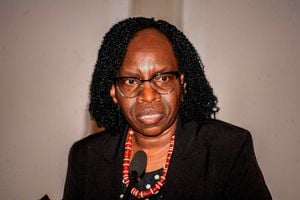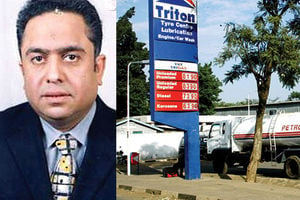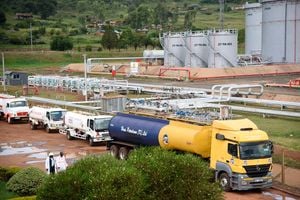
President William Ruto with the Crown Prince of Saudi Arabia Mohammed bin Salman at the King Abdul Aziz International Conference Centre in Riyadh in October, 2023.
The opposition has reignited the debate on the thorny issue of the government-to-government (G2G) oil supply agreement between Kenya and three national oil exporters from the Gulf, demanding a status update on the multibillion-shilling deal.
Nairobi Senator Edwin Sifuna, who is also the secretary-general of the Orange Democratic Movement (ODM), has sought a statement on the fate of the deal.
“The committee should inform the Senate of the current status of the [agreement], stating the oil marketing companies in Kenya currently involved and the intended end date,” Mr Sifuna said.
Early last year, Kenya signed an oil supply deal with Saudi Aramco, Emirates National Oil Corporation (Enoc) and Abu Dhabi National Oil Corporation Global Trading (Adnoc) when crude prices global stood at $81 per barrel.
The move saw President William Ruto come under sharp criticism from the opposition after it emerged during a Senate committee hearing that Kenya paid over Sh210 billion to Gulf companies under the G2G import credit scheme meant to address exchange rate volatility.
Yesterday, Mr Sifuna demanded that the government makes public the name of the banks in Kenya that are guaranteeing fuel import purchases agreements under the G2G deal.
Further, the government should give a breakdown by months of monies owed to the marketing companies under the deal.

Nairobi Senator Edwin Sifuna follows proceedings during a hearing of the Senate Energy committee at Parliament Buildings in Nairobi on Thursday last week.
In seeking the responses from Energy Cabinet Secretary Davis Chirchir, Mr Sifuna indicated that he wants an explanation why a supply of petroleum products under the G2G deal should continue, noting that the intended purpose of the deal was to cushion the shilling against the dollar, “an objective that has been obtained.”
In a statement sought on his behalf by Makueni Senator Daniel Maanzo, Mr Sifuna wants to know when the country will revert to the Open Tender System to import petroleum products.
Azimio la Umoja One Kenya Coalition Party leader Raila Odinga criticised the deal last year, maintaining that it was a sham that would cost taxpayers millions of shillings.
Mr Odinga even petitioned, through his lawyer Paul Mwangi, the Ethics and Anti-Corruption Commission, the Auditor-General and the Energy and Petroleum Regulatory Authority to investigate the matter.
He questioned how the three Gulf oil companies were chosen to handle local logistics, with senators probing the deal taken a back when they were informed that the government had already paid Sh210 billion to import oil under the controversial deal.
However, in January this year, in a report by the International Monetary Fund (IMF), the National Treasury said that the scheme has not worked as planned and the government was mulling exiting the arrangement.
National Treasury CS Njuguna Ndung’u came out strongly to dispel the concerns, saying the government did not admit to failure. The CSt clarified that the text quoted from the report was a misrepresentation of facts.
Prof Ndung’u explained that their statement to the IMF “specifically addresses the anticipated rollover risk associated with private sector financing facilities supporting the arrangement.”









